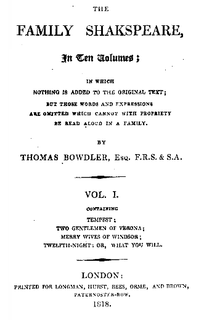A Quote by Thomas Bowdler
Those expressions are omitted which can not with propriety be read aloud in the family.
Related Quotes
If we are always reading aloud something that is more difficult than children can read themselves then when they come to that book later, or books like that, they will be able to read them - which is why even a fifth grade teacher, even a tenth grade teacher, should still be reading to children aloud. There is always something that is too intractable for kids to read on their own.
We have an obligation to read aloud to our children. To read them things they enjoy. To read to them stories we are already tired of. To do the voices, to make it interesting, and not to stop reading to them just because they learn to read to themselves. Use reading-aloud time as bonding time, as time when no phones are being checked, when the distractions of the world are put aside.
I've only cried at one book, but I'm too embarrassed to tell you which. It wasn't terribly intellectual. I will admit, though, to crying when I've read books aloud to my elementary class. We read a biography of Gandhi once, and it was very difficult to read the part where Gandhi was killed, because they were waiting for a happy ending.
The commandment to honor our parents echoes the sacred spirit of family relationships in which-at their best-we have sublime expressions of heavenly love and care for one another. We sense the importance of these relationships when we realize that our greatest expressions of joy or pain in mortality come from the members of our families
Parents must bring light and truth into their homes by one family prayer, one scripture study session, one family home evening, one book read aloud, one song, and one family meal at a time. They know that the influence of righteous, conscientious, persistent, daily parenting is among the most powerful and sustaining forces for good in the world. The health of any society, the happiness of its people, their prosperity, and their peace all find common roots in the teaching of children in the home.
Experts generally agree that taking all opportunities to read books and other material aloud to children is the best preparation for their learning to read. The pleasures of being read to are far more likely to strengthen a child's desire to learn to read than are repetitions of sounds, alphabet drills, and deciphering uninteresting words.




































